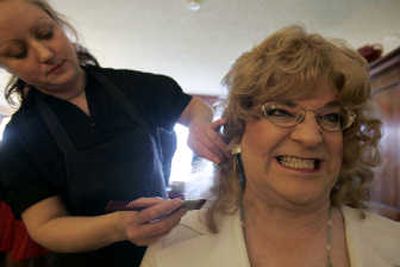Event is opportunity to dress up, step out

PORT ANGELES, Wash. – Raeann Hewitt threw on a dress and drove 400 miles last weekend to Washington’s Olympic Peninsula with an ear-to-ear smile, starting a journey toward the person she feels she was meant to be.
Now, learning to negotiate a high heel with several others outside a Red Lion Hotel, she knows her escape will soon be over.
That’s because she is really a he, an internal conflict that ultimately tore apart Hewitt’s marriage. Five years ago, the truck driver from small-town Idaho gave in to the urges that had chased him for years and started wearing women’s clothes.
For Hewitt to wear her black blouse, smoky brown skirt and sun-yellow wig back home would be asking for trouble. But in the logging town of Port Angeles, where the Esprit transgender conference this week celebrated its 19th year at the Red Lion, Hewitt’s cross-dressing is not only tolerated, it’s welcomed.
For the 165 people at this year’s event, life outside the box brings them together. Targeted largely at men ranging from those who feel more themselves in women’s clothes to those who want a full surgical transition, Esprit offers reassurance, bonding and guidance in the form of ladies’ nights out, wardrobe help and workshops.
For Hewitt (not his real name), the event is a respite from a closeted existence. Like most, he won’t reveal his given name; many men haven’t come out to their families, friends, co-workers or clients, or they fear the stigma could jeopardize their careers.
The weeklong Esprit conference, which runs through today, has been organized by Emerald City Seattle’s transgender social group since 1982 along with Portland’s Northwest Gender Association and Cornbury of Vancouver, B.C.
One of a handful of similar events around the country, it offers the nights out and seminars, as well as “S.O.” activities for those with wives and significant others comfortable enough to tag along. There’s also a “Big Sister/Little Sister” program linking those secure in their other skin with those just emerging from their cocoons.
Port Angeles might seem an odd choice for cross-dressers to congregate, but Seattle’s Debra Darling and fellow event founders had a method in mind. The site, with its quaintly shabby country comfort, is an easy midpoint for the three Northwest transgender clubs and a safe, out-of-the-way locale for those afraid to “go public” at home.
Businesses offer free lattes, cupcakes or 20 percent discounts, and attendees mix it up with locals at transgender band Nasty Habits’ raucous annual gig at Castaways, one of the club’s most popular events.
“They’re a hoot,” says Brenda Brat, of the Red Lion’s Crabhouse restaurant. “We have a blast with them, and they bring a lot of money to this town.”
Retired businesswoman Lou Lawrence, who hosts an annual dinner for event committee members, estimates the economic infusion at $300,000.
“This is a huge mountain for me to climb,” says first-timer Joan, a gruff, 62-year-old businessman from Victoria, B.C. “I’ve been dressing up since I was pre-adolescent, but I never walked out the door until yesterday.”
Seminars address everything from feminine speech and movement to medical procedures and “Blue Monday,” which preps attendees for the letdown that often follows their return to reality.
Gender, those in the community say, is who you are. Sexual orientation is who you’re attracted to. “To put it bluntly,” says Leah, one of Emerald City’s estimated 115 members, “gender is between the ears and sexual orientation is between the legs.”
Most are older, having embraced their urges in their 40s and 50s when they tired of societal limits and became financially and sexually secure enough to pursue a pricey second life. But many say they felt their urges as far back as grade school.
Growing up in the ‘50s and ‘60s, many fought to suppress their urges, isolated and depressed, coming of age when less was known about such identity and there was no Internet to link them together.
“For years we thought we were the only ones in the whole wide world,” says Seattle’s Kelly Hansen (not his real name).
They raided mom’s closet, making sure everything was put back just so. Some got caught, scolded, sent to psychiatrists, and buried themselves even deeper, overcompensating later by pursuing macho sports or careers.
“I had a whole stash of my sister’s clothes,” says Suzanne Adams, a former law-enforcement officer whose outfits accentuate her shapely legs and whose grandkids call her “Grandma.” “I had my own Brownie uniform. … It wasn’t until my 40s that I thought: I’d better face this. I don’t have to be ashamed.”
For some, it’s as simple as a black dress with matching black purse; others are drawn to a path that may lead to sex-reassignment surgery.
They craft new identities, from signature wardrobes and business cards to credit cards issued in their chosen “femme” name.
Few fit the stereotype of the flamboyant drag queen, choosing less flashy wear that simply helps them feel feminine.
In the conference boutique, engineer Stephanie Avion, of Snohomish County, flounced around in a wedding gown, jeweled and beaded with a bit of a train when suddenly, the Air Force vet burst into tears.
Later, she says: “It was as if something that had been tucked away was finally freed and embraced. And it was OK.”